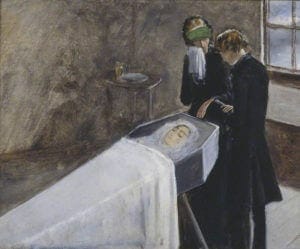Gregory W Rutecki
Cleveland, Ohio

George Lundberg posed an intriguing question for a generation of physicians: why don’t more doctors go to the funerals or calling hours of their patients?1 In fact, he boldly predicted that the only funeral you can be sure your physician will attend will be that of his own.1 I attended several of patients’ funerals when I was in practice as a nephrologist and cared for a group of patients whose annual mortality approximated 20%. A special intimacy often developed between the physician and the patient and his family, a relationship forged during three weekly encounters for many years; and on several occasions I took my wife and my nine- and seven-year-old sons with me to these calling hours.
Over one particularly turbulent two week period there were three deaths in my dialysis panel—Oscar, Georgia, and Ken. Each had an intense personal struggle that closed with their deaths. I had met Oscar after he ruptured an abdominal aortic aneurysm and spent over a month in the intensive care unit. He was on dialysis for over two months until he finally recovered renal function. One of my former mentors once said to Oscar, “Dr. R. saved your life.” Tears welled up in Oscar’s eyes, and every time I saw him after that he cried with his own version of gratitude and joy, feeling that I had I had helped him cheat death. He lived seven more good years, enjoying his daily ritual, riding high and in charge on his tractor. Everyone at his calling hours was buoyant because they all felt he had lived life to the fullest with some of it on borrowed time.
Georgia was a bona fide matriarch, having raised thirteen children. She had diabetic kidney disease and did well on dialysis for four years before her death. I had never met her children because they all lived out of town. Calling hours were at an African American church and each of her thirteen children gave me a hug, thanking me for their mother’s care and saying, “You always treated her with respect and compassion. She loved you.”
Ken’s story was one of the toughest clinical experiences I have had. His brother, a physician I knew, administered radiocontrast to Ken to work up an illness. The contrast for the exam diagnosed multiple myeloma and also precipitated renal failure. Ken was suddenly saddled with two life-threatening diagnoses. He vacillated between wanting to fight both diseases with ferocity and wanting to meekly surrender and welcome death. After months of dialysis, he insisted that he wanted to discontinue dialysis and die. He asked me to predict how long he would survive. I suggested he might have a week to ten days. Three weeks later, he was still carrying on and still asking when his ordeal would be over. He finally died in his sleep, with extreme elevations in his potassium level, his internal tension between fighting and dying never resolving. His calling hours were sad, but his wife never forgot Ken’s and my roles during his final struggle.
After these funerals for Oscar, Georgia, and Ken, my elder son asked my wife, “Mommy, is Daddy a good doctor?” “Why yes,” she answered, “why are you asking?” “Because every time I see Daddy’s patients they’re dead!” My later life reflections on patients’ calling hours and a physician’s presence are good ones. The experiences were intimate, uniquely shared among patient, family, friends, and physician. My boys learned about the real circle of life in a way which only a nephrology dad could share. To this day, they are non-committal as to whether their presence with me was bad or good. They did learn why their dad was frequently away from them, caring for sick people who had loving families of their own. Now that they are grown and have children, I think they finally understand why Oscar, Georgia, Ken, and their families thought I was a good doctor despite death’s eventual intrusion. Sharing the rituals of death may be a beneficial form of healing for physicians, their own families, and the families of their patients. George Lundberg attributed the absence of physicians from patient funerals as reflective of physicians’ fear of death,1 but a daughter of a physician who frequently attended the funerals of his patients said it better than I ever could: “my dad was personally moved by the loss of a patient, and his patients thought ‘Doc’ was family.”2
References
- Lundberg G.D. Why Don’t the Doctors Attend the Funerals of Their Patients who die? MedGenMed. 2007; 9:54.
- Chuparkoff KD. Readers respond to “Why Don’t Doctors Attend the Funerals of Their Patients Who Die.” MedGenMed. 2007; 9:49; published online September 6, 2007.
GREGORY W RUTECKI, MD, received his Medical Degree cum laude from the University of Illinois, Chicago (1974). He completed Internal Medicine training at the Ohio State University Medical Center (1977) and a Fellow-ship in Nephrology at the University of Minnesota (1980). After 12 years of Private Nephrology Practice, he re-entered Academic Medicine at The Northeastern Ohio Universities College of Medicine (awarded “Master Teacher” designation) and became the E. Stephen Kurtides Chair of Medical Education at Evanston Northwestern Healthcare and Professor of Medicine at the Feinberg School of Medicine, Northwestern University. He now practices Medicine at the Cleveland Clinic.
